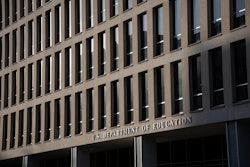 Paul Quinn College President Michael J. Sorrell, with his adviser Dr. Marybeth Gasman, at the successful defense of his dissertation proposal from the Executive Doctorate in Higher Education Management program at the University of Pennsylvania.
Paul Quinn College President Michael J. Sorrell, with his adviser Dr. Marybeth Gasman, at the successful defense of his dissertation proposal from the Executive Doctorate in Higher Education Management program at the University of Pennsylvania.
Each month, the 47-year-old president of Paul Quinn College boards a plane in Dallas to make the three-and-a-half-hour commute to Philadelphia, where he’s currently a doctoral student in the University of Pennsylvania’s Executive Doctorate in Higher Education Management program.
Despite an impressive career as a lawyer in corporate America, Sorrell—who was tapped seven years ago to lead the historically Black college—came to the realization that, without an earned doctorate, his academic portfolio as a college president would be incomplete.
“My students need me to be a great college president,” he says. “This degree will add value to my skills.”
With the blessing of his board of trustees and his family, Sorrell has become a student yet again. And he is not alone.
Experts say that, over the past decade, the number of college presidents enrolling into doctoral programs has steadily increased, particularly as more colleges and universities look outside academia to find talented individuals to lead their struggling institutions.
For Sorrell, the decision to invest time and money into returning to the classroom was largely influenced by the sage advice offered to him by Dr. Freeman A. Hrabowski III, the prominent president of the University of Maryland Baltimore County.
















